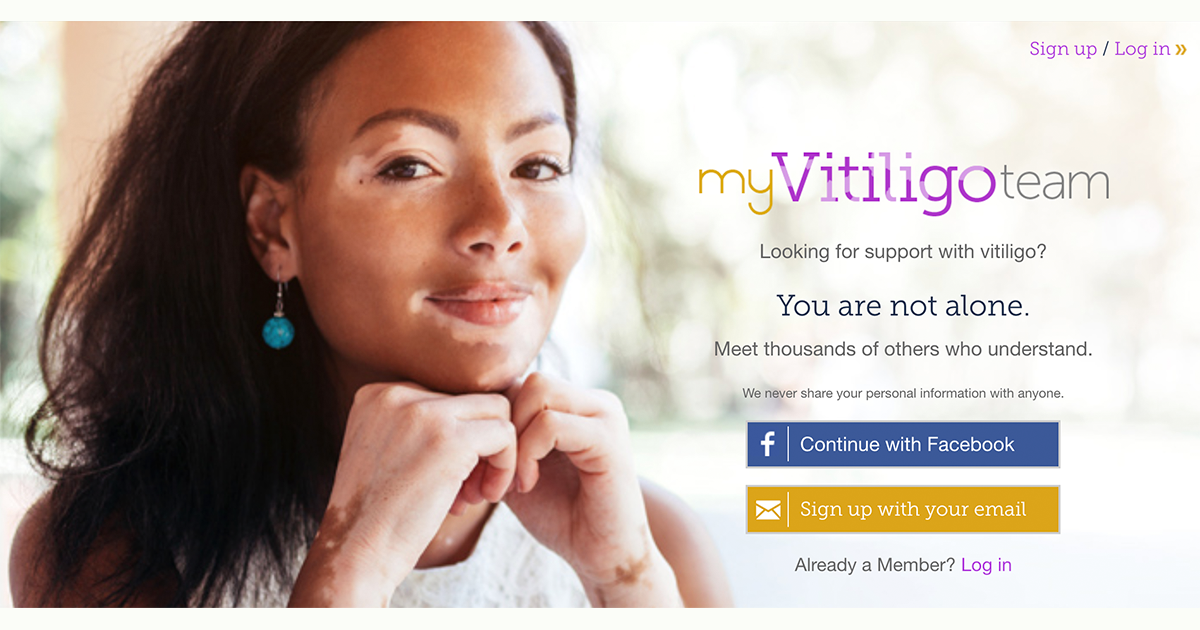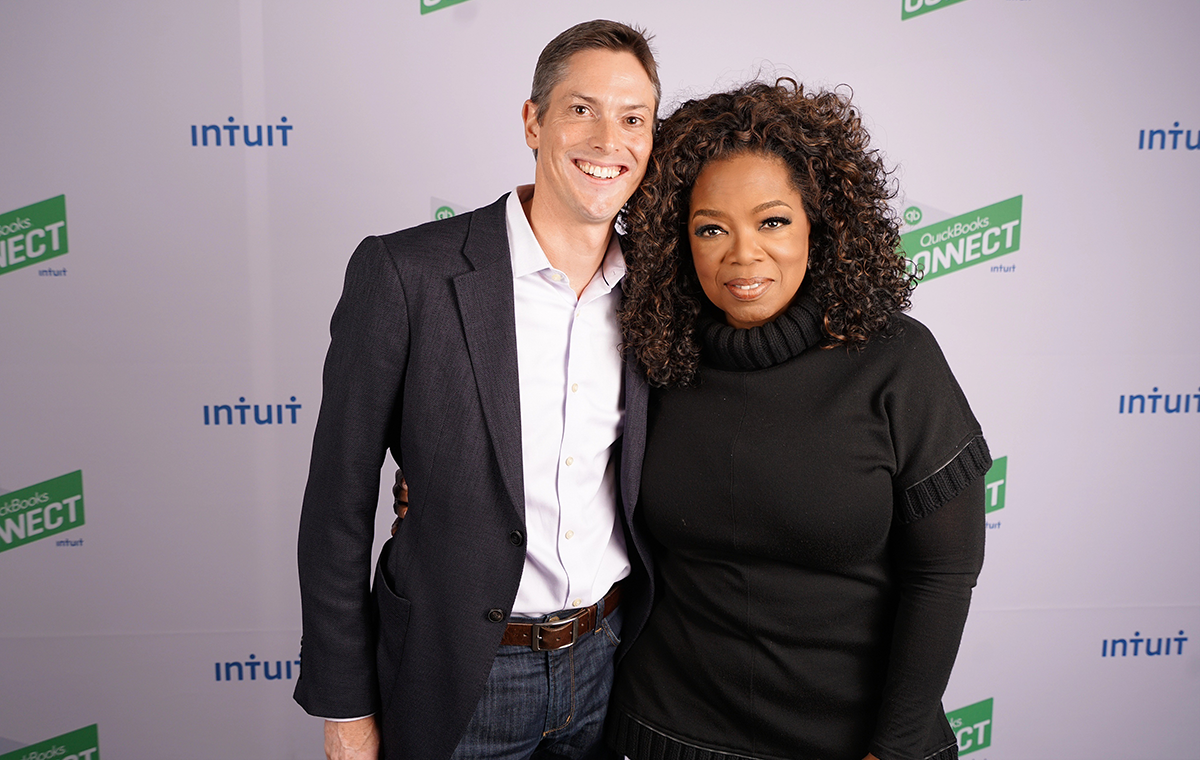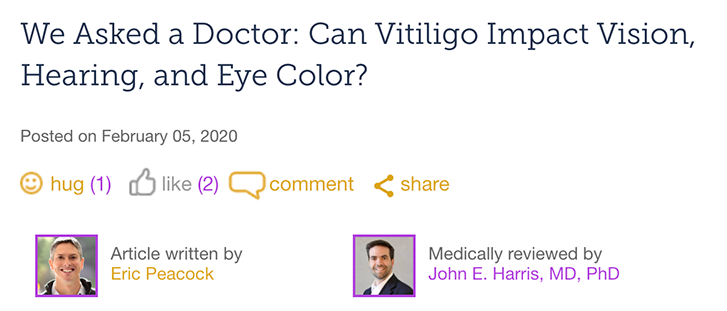Eric Peacock is the cofounder of MyVitiligoTeam - a fast-growing social network for people facing vitiligo. In just two months after launching, over 2000 people with vitiligo have joined, and hundreds more are joining every month. Eric, who has had vitiligo since he was a child, also happens to be the cofounder and CEO of MyHealthTeams - a mission-driven company that has already created similar social networks in over 30 other chronic conditions. Over the past 8 years MyHealthTeams has attracted more than 2.2 million registered members from around the world and been featured on the TODAY show. That’s Eric when he got a chance to meet with Oprah to talk about starting a mission-driven business.


Eric is passionate about making it easy for people with vitiligo to find the people, support, and information they need along their journeys. He’s already interviewed me about how vitiligo impacts eye color, vision and hearing, and he is working with other doctors in the Global Vitiligo Foundation to provide educational content about vitiligo.

Me: Why did you create MyVitiligoTeam and who is it for?
Eric: MyVitiligoTeam is free and it’s open to adults diagnosed with vitiligo, their spouses, and parents of children with vitiligo. No one facing vitiligo should have to feel alone or uninformed about their condition, but they often do. I certainly was. Our goal is to fix that by creating a safe, judgement-free, place to connect with other people who “get it”. We also want to make it easy to find objective, educational content about vitiligo from folks like you and the Global Vitiligo Foundation.
Me: You started a company 8 years ago that creates social networks for people with chronic conditions and you have vitiligo. Why did you wait so long to launch one in vitiligo?
Eric: I’ve gone most of my life totally misinformed about vitiligo believing what my childhood pediatrician told me about the spots on my hands and knees back in the first grade. He said, “It’s vitiligo - lack of pigmentation in the skin. Only about 1 in a million people get it. Harmless, nothing to do about it.” Turns out he was wrong on everything but the diagnosis, but it’s what I assumed was the truth for about 38 years! I thought I was alone with vitiligo, that there weren’t other folks like me who had it, and there was nothing I could do about my vitiligo even if I wanted to, so I never really thought that a social network would be used. Then about 2 years ago I came across the Global Vitiligo Foundation and learned that 1 in 100 people have it, that there are treatments available for those who want them, and some surprisingly effective biologic therapies in clinical trials. I know about the emotional toll vitiligo can have so it became pretty clear that we should launch MyVitiligoTeam. As a member it feels great to be getting to know so many others on this journey!
Me: What do most people use the social network for?
Eric: There tend to be at least four different types of uses for a social network like this.
- Giving and receiving emotional support - from other people who understand what it’s like to have vitiligo. Your Facebook friends don’t always “get it”.
- Learning about Vitiligo - Our resources section has objective, educational information. We get the medical content reviewed by the doctors affiliated with the Global Vitiligo Foundation like yourself.
- Asking Questions / Getting practical tips from members - “How should I explain vitiligo to my son’s 3rd grade class?” or “Does your vitiligo ever itch?” or “How do you get treatment covered by your insurance?” or “Is anyone in the clinical trial?” The list goes on and on. Living with a chronic condition is about so much more than just what happens in the healthcare system and folks turn to each other to fill in the gaps.
- Connecting with the people on your team. You can add other members to your Vitiligo Team (kind of like following someone on twitter) - and easily stay in touch with them.
Me: Is it private?
Eric: Member privacy is critical. We do not sell or share your personally identifying information with anyone. MyVitiligoTeam is password protected so google can’t crawl your profile like on some public forums. What you share on the social network can only be seen by the other members of the social network.
Me: You mentioned wanting MyVitiligoTeam to be “non-judgemental”. What do you mean by that?
Eric: We’re there to listen to and support each other - not direct or judge each other. For instance, I’m probably not a person who will seek out treatment for my vitiligo, but I can totally understand why many people do. It’s a personal decision and not one to judge.
Me: MyVitiligoTeam is free. How do you pay for it?
Eric: Yes, it will always be free for members and we don’t want to take any funding from foundations because that sort of funding should go to research and patient services. It’s a personal mission of mine to prove that you can have a company that does good and does well. We will partner with a company under two conditions. First, we must be transparent with our members. Second, it must empower our members. So we could reach out to our members about a clinical trial for a new treatment in vitiligo that might be available to them, and let them know how to connect with the company running that trial if it was of interest. Down the line we may have advertisements on the social network as well.
Me: How big do you think MyVitiligoTeam will get?
Eric: I’m hoping we will get hundreds of thousands of members but it will take the community to help us get out the word. Our biggest social network to date is in fibromyalgia with about 270,000 members. MyVitiligoTeam is open in 13 English-speaking countries: USA, Canada, Ireland, the UK, Netherlands, Denmark, Sweden, Norway, Greenland, Finland, South Africa, Australia and New Zealand. If we can all help in getting the word out we could even reach millions.
 Me: What you’ve done for all individuals with health conditions is really incredible. What is the most difficult and also the most rewarding thing about starting and maintaining MyHealthTeams?
Me: What you’ve done for all individuals with health conditions is really incredible. What is the most difficult and also the most rewarding thing about starting and maintaining MyHealthTeams?
Eric: Thank you very much. I think everyone wants to see their work have an impact. Every Monday morning we have a whole company meeting in which we read aloud one or two posts that members have made talking about how their life has changed from something they learned or experienced by being part of one of our social networks. There is no reward greater than that. It fires us up and gives us the inspiration and fuel to put in all the late nights of work that it takes to make these social networks thrive and grow. We all joined for the mission so seeing it have an impact every day is a huge perq of the job! I think the most difficult thing for us is getting the word out about our social networks so that everyone who could benefit from the social network actually hears about it. It’s possible you may not know anyone with vitiligo, for example, so even if you learn about MyVitiligoTeam from this blog post - you may not be able to tell anyone about it (But if you do know others with vitiligo - PLEASE DO TELL THEM ABOUT IT!) Same thing is true for MyPsoriasisTeam, MyRATeam, MyCrohnsAndColitisTeam and so on. So we need help from the broader community of people with vitiligo, doctors and nurses treating the condition, and foundations to help us spread the word.
Me: So how can people find out more about MyVitiligoTeam?
Eric: Feel free to check it out at www.MyVitiligoTeam.com - and please reach out to us if you have any feedback, ideas or questions!